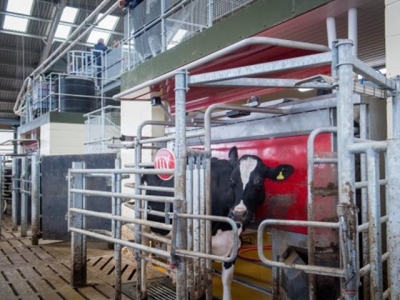New UK dairy centre: Robotic milking at the forefront

One of the UK’s leading universities has just opened a new state of the art £6million (€ 6.85million) centre for dairy science innovation expanding its existing dairy facilities.
The facilities will allow studies with up to 100 individually-fed, high-yielding dairy cows and heifers, to test the effect of a range of diets on milk production and composition, feed intake and live-weight change. Photo: Chris McCullough
The University of Nottingham, which delves into research into health, nutrition and welfare of dairy cows, has opened the new facility at its Sutton Bonington campus.
The intention for the new centre is to offer the latest research technologies to aid studying a range of dairy-related topics including mastitis control, antimicrobial resistance, feed efficiency, environmental emissions and new so-called wearable technologies for the herd.
More robotic milking machines
The new facility will increase the size of the university’s current dairy herd from 240 to 360 cows and will be focused on 4 main areas of research. At the forefront of new technology being used in the centre are robotic milking machines. The expansion will double the farm’s Lely Astronaut robotic milking machines from 4 to 8.
Cows decide when they are ready to be milked and go into the milking machine, where motorised brushes clean their teats before laser guided milking cups attach themselves automatically. When milking is finished, the cows udders are disinfected again before leaving the machine. Small robot scrapers will patrol the floor of the facility on a programmed route, slowly weaving their way around hooves and maintaining the general hygiene by pushing waste through specially-designed concrete slats in the ground, returning periodically to their stations to re-charge.
Technologies for disease prevention and welfare
A new building will be the focus on emerging technologies to prevent disease and improve cow welfare. The unique flexible housing facility for 2 groups of around 30 animals will allow researchers to evaluate the impact of the environment on the health, welfare and physiology of housed dairy cows. It will be possible to test the effects of building layout, access to indoor and outdoor loafing space, feed space and bedding on cow physiology, production, health, welfare and economics.
The facilities will allow studies with up to 100 individually-fed, high-yielding dairy cows and heifers, to test the effect of a range of diets on milk production and composition, feed intake and live-weight change. It will also study issues including rumen function, digestibility, greenhouse gas emissions, reproduction and feeding behaviour.
European dairy hub
The facility is part of the dairy hub of the Centre for Innovation and Excellence in Livestock (CIEL), which brings together 12 world-class research institutes creating Europe’s largest applied animal research group to develop new industry-needed solutions as well as commercial trial farms for real world, with the ultimate aim of delivering improved food quality and farming systems.
Related news
 How to keep a donkey healthy
How to keep a donkey healthy Donkeys and horses have several diseases in common, but symptoms and treatment differ, says Prof Cheryl McCrindle.
 Using ‘cow power’ to make your dairy farm self-sufficient
Using ‘cow power’ to make your dairy farm self-sufficient Manure can be used to produce biogas, electricity and fertiliser. In the process, you will recycle nutrients and increase profits while reducing pollution
 Supplemented pasture systems may boost beef fatty acid range
Supplemented pasture systems may boost beef fatty acid range Supplementing cattle on pasture with a lipid source may improve omega-3 and omega-6 concentrations and fatty acid composition of the beef produced, say research